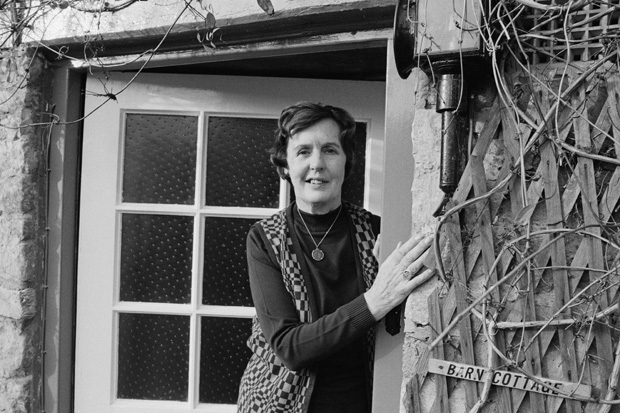Anyone who has ever listened to the thump of a rejected manuscript descending cheerlessly on to the mat can take comfort from the roller-coaster career of Barbara Pym. Between 1950 and 1961 Miss Pym (1913–1980) had published six modestly successful novels with the firm of Jonathan Cape. Then, on 24 March 1963 — ‘a sobering fourth Sunday in Lent’, as Ann Allestree is careful to remind us — came a bolt from the skies, in the shape of a letter from Cape’s editorial director, Wren Howard, turning down the seventh with the age-old publisher’s bromide that ‘in present conditions we could not sell a sufficient number of copies to cover costs’.
There seems little doubt that this throwing over was the great trauma of Pym’s life, far more upsetting to her than the various relationships that punctuated her half-century of wistful spinsterdom, and a kind of King Charles’s Head to which she infallibly reverted in conversations with dinner guests or letters to literary chums. A vilely coloured milk jelly was even christened ‘Maschler Pudding’ in tribute to the Cape editor who had inspired Wren to pull the plug. Friends rallied round — Philip Larkin wrote personally to his own sponsor, Charles Monteith — but it took a top billing in the famous 1977 TLS symposium on underrated talent to bring her books back into print and secure a Booker short-listing for Quartet in Autumn.
For all her sympathy, Allestree is careful not to exaggerate the sense of a sacrificial lamb served up on the altar of changing 1960s taste. Certainly the Age of Aquarius was a difficult era for the genteel lady novelist: A Shake of the Dice (2014), the latest volume of David Kynaston’s post-war history, prints a selection of the increasingly injurious reviews dished out to Pym’s contemporary Elizabeth Taylor, who found herself damned not for lack of accomplishment but, in an egalitarian age, for being too middle-class. On the other hand, there is a suspicion that An Unsuitable Attachment, turned down by countless other publishers before finally being brought out after her death, might not have been a terribly good book in the first place.
That the Cape debacle came as such a jolt to Pym’s system — she admitted to ‘moments of gloom and pessimism when it seems that nobody could ever like my kind of writing again’ — was naturally a mark of the seriousness with which she took her work, but it may also have been a result of the somewhat low-key tenor of her existence. Her life turns out to have been pretty much the world of her books, a rather downbeat purview of English domestic interiors, pale young women, game curates, discreet Anglicanism and — see the Maschler pudding —culinary experiments, set against a backdrop of cats, cardigans and garden creepers.
What might be called the ticket-collector-on-the-oblivion-express view of literary life would have no trouble at all in patronising Pym’s diffident journey from bourgeois Oswestry to boarding school, Oxford, war-time service in the Wrens and a 28-year-stint at the International Africa Institute, where she combined the assistant editorship of Africa with a determination never to visit the place in person. Yet the serial misfortunes outlined in Douglas Matthew’s customarily excellent index (‘hypochondria, 53… depression, 85–6, parathyroid gland removed, 107’ etc) shouldn’t blind us to the intensity she brought to its fictional projection. As Anthony Powell put it, you have to get the hang of her personality and the limited range of characters, who become very funny once properly understood.
As to the personality itself, there is a way in which Pym herself hangs slightly out of reach, suspended somewhere in bright air with the things she really wants either unvoiced or a yard or so beyond her grasp. Her love affairs — one of them with the future Tory MP Julian Amery, whose formidable mother turns up in several of her novels — carry the faint hint of desultoriness, abandonment always glimpsed in the distance, the significant other’s unsuitability forever lodged across the track. Of the two-woman household, variously located in Pimlico, Queen’s Park, Barnes and Oxfordshire, a friend recalled of Barbara’s sister that ‘Hilary was the jolly one’.
A Passionate Force is an exemplary piece of old-style propagandist belles lettres, marred only by Allestree’s waywardness with prepositions and her habit of getting members of the supporting cast slightly wrong. The merest glimpse of a photograph of Larkin’s girlfriend, Monica Jones, should dispel the idea that she was a ‘matronly companion’, and to describe Desmond MacCarthy as ‘the late drama critic’ is like saying that Betjeman wrote chiefly on architectural subjects.
But these faults are entirely redeemed by some of the incidental connections — the discovery, for example, that the sisters’ neighbour in post-war SW14 was the pornographer Paul Raymond; or that one of the unsuitable men at whom Barbara flung herself in the 1940s was married to a woman who went on to become the mother of Soft Machine’s drummer Robert Wyatt.
Available from the Spectator Bookshop, £16.49 Tel: 08430 600033






Comments